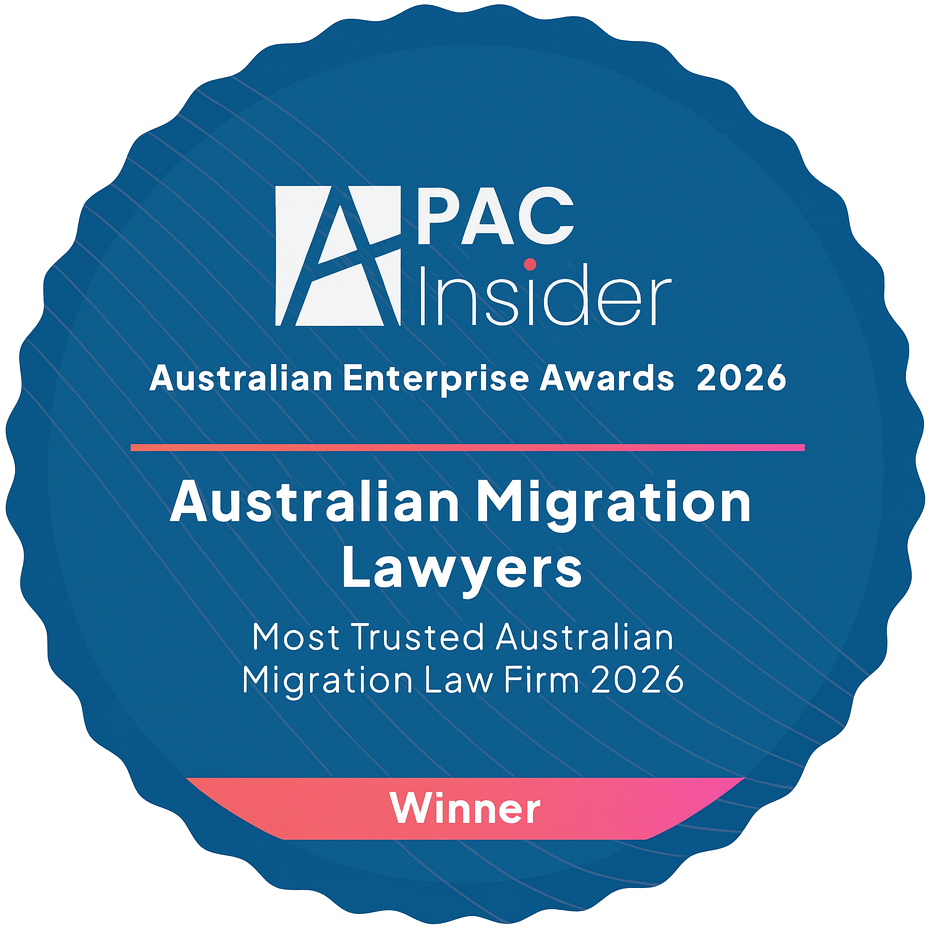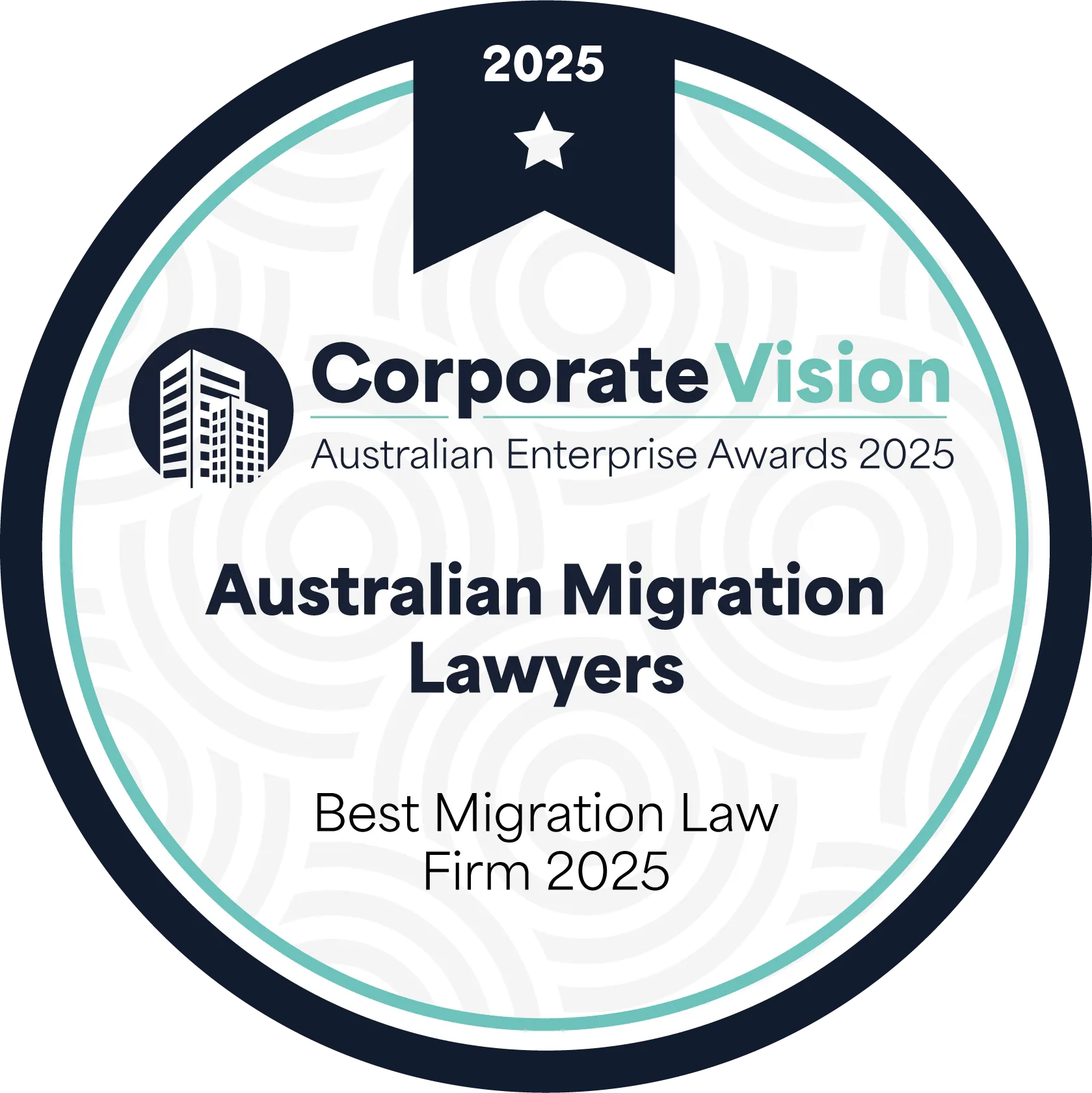Australia's largest independent migration law firm. Open 7 days! Book here.
Need help? We are available 7 days a week.

.webp)

Winner of Most Trusted Australian Migration Law Firm 2023-2026

Ranked 1st for migration law in 2023, 2024 & 2025

Ranked in the top migration lawyers 2023, 2024 & 2025

Ranked the best migration law firm 2024 & 2025

For those individuals who are seeking to immigrate to Australia on a permanent basis and have exceptional and outstanding achievements in their professional field, the Global Talent visa (subclass 858) is an attractive option.
This blog post will help demystify the various occupations and skills that are recognised under the Global Talent visa at the time of writing, and help applicants identify whether they are engaged in something which may provide them with an opportunity to seek Australian permanent residency.
Notably, the Global Talent visa is expected to be replaced in late 2024. While information about the new ‘National Innovation’ visa is yet to be released at the time of writing, it is likely that Australia's objectives under the two visas will be the same. Potential applicants need to make themselves aware of how these changes may affect their visa options and consider it in reading this blog’s information.
For applicants who have questions or wish to explore the possibility of applying for a Global Talent visa, they should contact an Australian Migration Lawyer.
[free_consultation]
If you are interested in getting more information about a temporary skills shortage visa, get in touch with Australian Migration Lawyers for a consultation.
[/free_consultation]
The Global Talent visa (subclass 858) is a permanent visa that is the critical mechanism for implementing Australia’s Global Talent Independent program. It is designed to expedite the process for individuals with an internationally recognised record of exceptional talent and achievements in eligible fields to gain permanent residency. This visa attracts highly skilled individuals from a range of sectors, including various professions, sports, academia, arts and research, leveraging their internationally recognised achievements for the benefit of the Australian community.
To be eligible, applicants primarily will be required to demonstrate that they possess exceptional skills and talents that have been internationally recognised. However, there there are several eligibility criteria for the visa including:
The application process for the Global Talent visa is relatively straightforward. Highly skilled individuals are required to fill out a visa application, submit relevant documents and provide evidence (such as identity documents, relationship documents, character documents and evidence of relevant qualifications), and pay an application fee. Individuals can apply for this visa online, and either onshore or offshore.
The Australian Government uses this visa to attract highly skilled individuals through providing them permanent residency. This means that visa holders of a Global Talent visa are entitled to benefits including:
Applicants should be aware that there are two Global Talent visa pathways available: the Distinguished Talent pathway and the Global Talent pathway. These pathways establish any additional requirements for potential applicants, and subsequently provide guidance as to what occupations are considered by the Department as eligible for a Global Talent visa.
Applicants should be aware that Departmental officers (formally known as Global Talent Officers) can not help provide individual guidance and support to applicants.
The Distinguished Talent pathway is for exceptionally talented individuals that have an internationally recognised record of exceptional and outstanding achievement. This pathway covers areas not designated by the Australian Government as target sectors. Under the Distinguished Talent pathway, individuals are still required to prove their skills, talents and benefit to the Australian community, however they are not required to undertake an expression of interest process. This pathway provides applicants in occupations not within target sectors to still apply for a Global Talent visa. This can include various professions, sport, the arts, academia or research.
The Global Talent pathway provides priority processing for highly skilled applicants that currently earn or are likely to earn at the Fair Work High Income threshold and have an internationally recognised record of exceptional and outstanding achievements within the Australian Government’s target sectors. This pathway requires that applicants complete an expression of interest and are invited to apply for the Global Talent visa.
In consideration of whether the applicant can attract the Fair Work High Income threshold, the department will consider current earnings showing in payslips or contracts, future job offers, academic/professional qualifications relevant to the sector. This indicates that the kinds of occupations that the Department considers suitable for the Global Talent visa must be of a seniority/level that attracts a higher monetary compensation.
Regarding the target sectors, the Australian Government highlights what the sector includes and provides guidance as to what individual occupations will be considered exceptional, strong or not meet the parameters of the Global Talent Program. The 10 target sectors are: resources, Agri-food and AgTech, Energy, Health Industries, Defence, Advance Manufacturing and Space, Circular Economy, DigiTech, Infrastructure and Tourism, Financial Services and FinTech and Education. The following will summarise the guidance provided by the Department:
The Australian Government has stated that the Resources sector includes specialisations such as geology, metallurgy, resource waste management, automation and industry 4.0 skills. Exceptional candidates include a managing director of a technology and innovation unit in a global mining corporation. Strong candidates include executives with critical mineral development experience and leading researchers in high-temperature systems. Professions that would not meet the program’s parameters include site managers, engineers, mechanics, technicians and construction workers.
The Australian Government has stated that the Agricultural sector considered includes specialisations such as agricultural data analytics, biotechnology, blockchain technology, biosecurity, food tech precision engineering and predictive analytics. Exceptional candidates include directors of world-renowned research centres for livestock genetic engineering. Strong candidates are highly cited post-doctoral researchers in agricultural robotics and automation. Professions that would not meet the program’s parameters include farmers, agricultural technicians, food safety managers, quality control managers, import and export managers, chefs and cooks.
The Australian Government has stated that the Energy sector includes specialisations such as advanced visualisation technology, artificial technology and machine learning, automation and robotics, traceability technologies, hydrogen technology, renewables, battery/energy storage design, bioenergy and micro-grid design. Exceptional candidates include founders and CEOs of internationally acclaimed clean technology start-ups. Strong candidates include senior energy transformation engineering specialists and executives in large energy project development. Professions that would not meet the program's parameters include technician, construction workers, distribution and sales representatives and junior or mid-level power plant or mine operations managers.
The Australian Government has stated that the Health sector includes specialisations such as antimicrobial resistance, biochemistry, biotechnology, genomics, clinical trials, digital health, health economics, medical devices, nanotechnology and regenerative medicine. Exceptional candidates include executives and founders of global pharmaceutical companies and renowned infectious diseases researchers. Strong candidates include senior auditory neuroscientists and biomedical engineers specialising in medical appl;ications of polymers and biomaterials. Professions that would not meet the program’s parameters include general practitioners, retail pharmacists, dentists, physiotherapists, nurses, veterinarians and aged care workers.
The Australian Government has stated that the Defence sector includes specialisations such as advanced materials, combat system integration, emerging military technology and secure communications. Exceptional candidates include business directors of international organisations certifying defence vessels and equipment. Strong candidates include senior technology managers at aeronautical R&D centres. Professions that would not meet the program’s parameters include soldiers, sailors and junior officers.
The Australian Government has stated that the Advanced Manufacturing sector includes specialisations such as advanced materials, 3D printing, AI, digital design and sustainable manufacturing. Exceptional candidates include leading researchers in micro and nano electro-mechanical systems and chief technology officers of sensor manufacturers. Strong candidates are senior data scientists specialising in AI. Professions that would not meet the program’s parameters include engineering technicians, machine operators, draftspersons, quality control managers and sales and administrative managers.
The Australian Government has stated the Space sector sector includes specialisations such as space systems engineering, propulsion, navigation, sensors, IoT technologies and space law. Exceptional candidates include space industry leaders in space systems engineering and head engineers of avionics at leading rocket companies. Strong candidates include space policy specialists and PHD degree holders in astrophysics. Professions that would not meet the program’s parameters include engineers and mechanics who do not lead groundbreaking projects.
The Australian Government has stated the Circular Economy sector includes specialisations such as AI and digital technologies, bioenergy generation, bio-methane production, sustainable supply chain practices, energy infrastructure, environmental science, recycling, emissions reduction and waste-to-energy technology. Exceptional candidates include senior well engineering managers overseeing advanced carbon capture projects. Strong candidates include PHD and Masters degree researchers with high-impact publications in metallurgy, circular economy and solar photovoltaic end-of-life issues. Professions that would not meet the program’s parameters include engineers and mechanics not leading international projects and sales or purchasing representatives.
The Australian Government has stated that the Digital Technology sector includes specialisations such as data science, AI and machine learning, automation, big data, blockchain, cloud computing, 5G, cybersecurity, smart tech, IoT, immersive technologies, machine learning engineering, network architecture, digital games, quantum computing, smart cities, software development and 3D printing. Exceptional candidates include founders or investors of deep tech IP, experts in human-centred design for high-end IT firms and chief information security officers driving major initiatives. Strong candidates are founders of award-winning video game companies and researchers in software and AR/VR/XR technologies. Professions that would not meet the program’s parameters include business analysts, developers, ICT consultants without international experience and ICT support centre managers.
The Australian Government has stated that the Infrastructure sector includes specialisations such as managing large transport infrastructure projects, smart city technologies, new electricity grid technologies and water manager technologies. Exceptional candidates include chief operating officers of national freight companies and chief commercial officers of global airlines. Strong candidates include internationally recognised railway operations experts and managing directors of companies known for sports infrastructure. Professions that would not meet the program’s parameters include engineers, mechanics, contract administrators and draftspersons.
The Australian Government has stated that the Tourism sector includes specialisations including developing new tourism infrastructure, high-value attractions and sustainable tourism. Exceptional candidates include chief commercial officers of global airlines. Strong candidates include managing directors of companies known for international sports events. Professions that would not meet the program’s parameters include tour guides, travel agents, hospitality workers, food and beverage managers and taxi and rideshare drivers.
[about_us]
Australian Migration Lawyers was founded to offer clients the best migration services available in Australia. Our team of experienced lawyers are ready to help you with your next steps.
[/about_us]
The Australian Government has stated that the Financial Technology sector includes specialisations such as financial data science, fintech cybersecurity, cloud technologies, software engineering, user experience digital assets, blockchain engineering, regtech, wealthtech, insurtech, neobanking, digital wallets, cryptocurrencies, automated financial advice and platform banking. Exceptional candidates include CEOs and founders of globally recognised digital asset enterprises. Strong candidates include executives in multinational corporations involved in global financial ICT strategy, AI cloud strategy, risk and insurance or financial services operating models. Professions that would not meet the program’s parameters include traditional bankers (except C-suite executives), investors, retail bankers, accountants, financial advisors, stockbrokers, insurance brokers and chief financial officers (unless they lead in a priority sector).
The Australian Government has stated that the Education sector includes specialisations such as senior management in universities, senior academics and researchers, education infrastructure, curriculum development, digital education platforms and edtech. Exceptional candidates include executives with expertise in establishing global university centres and renowned level E academics. Strong candidates include ICT solutions experts for eLearning providers and research commercialisation executives in education policy. Professions that would not meet the program’s parameters include researchers and academics at levels A to C, school teachers, specialist teachers and school administrators.

Additional guidance for applicants on the types of occupations considered to be eligible for the Global Talent visa can also be gauged from information released by the Department. Under Australia’s Freedom of Information Regime, individuals and organisations can request the Department of Home Affairs release information related to migration. This can include information on the type, number and specifics of grants made to visa applicants under different subclasses. The most recent data is available from disclosures made by the Department in 2021. For the purposes of Global Talent visas, this data reveals:
It has been announced that the Global Talent visa will be phased out by the end of 2024. Although specific details about these changes at the time of writing are limited, the introduction of the new National Innovation visa is expected to bear some resemblances to the Global Talent visa and target the same highly skilled individuals. Potential applicants should stay informed about these upcoming changes and consider how they may impact future visa applications.
While applicants and sponsoring employers can apply for a TSS visa independently, an Australian Migration Lawyer can provide professional assistance in what can be a confusing and time-consuming application. Australian Migration Lawyers are able to assist all parties understand the potential costs of applying and give a comprehensive estimate of the total expenses for obtaining a TSS visa. This can include advising of hidden or unexpected costs that may arise during the process. Should applicants and sponsoring employers wish to receive detailed advice and assistance with a TSS visa, contact an Australian Migration Lawyer who can ensure that the application process is a smooth and informed journey.
[aml_difference][/aml_difference]
There is nothing to prevent individuals from applying for a Global Talent visa independently. However, with the assistance of an Australian Migration Lawyer, applicants can increase their chances of receiving a successful outcome. This is because at Australian Migration Lawyers, we are knowledgeable and experienced in assisting applicants lodge Global Talent visa applications successfully and at a ‘decision-ready’ standard. An Australian Migration Lawyer can assist applicants to understand if they are engaged in an eligible occupation under the Global Talent visa, and explore their visa pathways and eligibility if they wish to permanently immigrate to Australia. With the coming changes to the Global Talent visa, an Australian Migration Lawyer will be equipped to provide up-to-date information and advice to potential applicants in what could be an uncertain time.

We have created comprehensive visa guides that outline the ins and outs of visa applications. Get yours today.